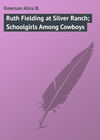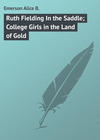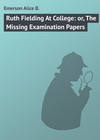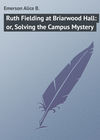Loe raamatut: «Ruth Fielding In the Red Cross; Doing Her Best For Uncle Sam», lehekülg 6
CHAPTER XV – NEW WORK
The prefect of police at Lyse was quite right. Clair was within sound of the big guns. Indeed, Ruth became aware of their steady monotone long before the rattling car reached its destination.
As the first hour sped by and the muttering of the guns came nearer and nearer, the girl asked Charlie Bragg if there was danger of one of the projectiles, that she began faintly to hear explode individually, coming their way. Was not this road a perilous one?
“Oh, no, ma’am!” he declared. “Oh, yes, this road has been bombarded more than once. Don’t you notice how crooked it is? We turn out for the shell holes and make a new road, that’s all. But there’s no danger.”
“But aren’t you frightened at all – ever?” murmured the girl of the Red Mill.
“What is there to be afraid of?” asked the boy, whom his family called “Bubby.” “If they get you they get you, and that’s all there is to it.
“We have to stop here and put the lights out,” he added, seeing a gaunt post beside the road on which was a half-obliterated sign.
“If you have to do that it must be perilous,” declared Ruth.
“No. It’s just an order. Maybe they’ve forgotten to take the sign down. But I don’t want to be stopped by one of these old territorials – or even by one of our own military police. You don’t know when you’re likely to run into one of them. Or maybe it’s a marine. Those are the boys, believe me! They’re on the job first and always.”
“But this time you boys who came to France to run automobiles got ahead of even the marine corps,” laughed Ruth. “Oh! What’s that?”
They were then traveling a very dark bit of road. Right across the gloomy way and just ahead of the machine something white dashed past. It seemed to cross the road in two or three great leaps and then sailed over the hedge on the left into a field.
“Did you see it?” asked Charlie Bragg, and there was a queer shake in his voice.
“Why, what is it? There it goes – all white!” and the excited girl pointed across the field, half standing up in the rocking car to do so.
“Going for the lines,” said the young driver.
“Is it a dog? A big dog? And he didn’t bark or anything!”
“Never does bark,” said her companion. “They say they can’t bark.”
“Then it’s a wolf! Wolves don’t bark,” Ruth suggested.
“I guess that’s right. They say they are dumb. Gosh! I don’t know,” Charlie said. “You didn’t really see anything, did you?” and he said it so very oddly that Ruth Fielding was perfectly amazed.
“What do you mean by that?” she demanded. “I saw just as much as you did.”
“Well, I’m not sure that I saw anything,” he told her slowly. “The French say it’s the werwolf – and that means just nothing at all.”
“Goodness!” exclaimed Ruth, repeating the word. “What old-world superstition is that? The ghost of a wolf?”
“They have a story that certain people, selling themselves to the Devil, can change at will into the form of a wolf,” went on Charlie.
“Oh, I know! They have that legend in every language there is, I guess,” Ruth returned.
“Now you’ve said it!”
“How ridiculous that sounds – in this day and generation. You don’t mean that people around here believe such stories?”
“They do.”
“And you half believe it yourself, Mr. Bragg,” cried Ruth, laughing.
“I tell you what it is,” the young fellow said earnestly, while still guiding the car through the dark way with a skill that was really wonderful. “There are a whole lot of things I don’t know in this world. I didn’t used to think so; but I do now.”
“But you don’t believe in magic – either black or white?”
“I know that that thing you saw just now – and that I have seen twice before – flies through this country just like that, and at night. It never makes a sound. Soldiers have shot at it, and either missed – or their bullets go right through it.”
“Oh, how absurd!”
“Isn’t it?” and perhaps Charlie Bragg grinned. But he went on seriously enough: “I don’t know. I’m only telling you what they say. If it is a white or gray dog, it leaps the very trenches and barbed-wire entanglements on the front – so they say. It has been seen doing so. No one has been able to shoot it. It crosses what they call No Man’s Land between the two battlefronts.”
“It carries despatches to the Germans, then!” cried Ruth.
“That is what the military authorities say,” said Charlie. “But these peasants don’t believe that. They say the werwolf was here long before the war. There is a chateau over back here – not far from the outskirts of Clair. The people say that the woman lives there.”
“What do you mean – the woman?” asked Ruth, between jounces, as the car took a particularly rough piece of the road on high gear.
“The one who is the werwolf,” said Charlie, and he tried to laugh.
“Mr. Bragg!”
“Well, I’m only telling you what they say,” he explained. “Lots of funny things are happening in this war. But this began before August, nineteen-fourteen, according to their tell.”
“Whose tell? And what other ‘funny’ things do you believe have happened?” the girl asked, with some scorn.
“That’s all right,” he declared more stoutly. “When you’ve been here as long as I have you’ll begin to wonder if there isn’t something in all these things you hear tell of. Why, don’t you know that fifty per cent, at least, of the French people – poilus and all – believe that the spirit of Joan of Arc led them to victory against the Boches in the worst battle of all?”
“I have heard something of that,” Ruth admitted quietly. “But that does not make me believe in werwolves.”
“No. But you should hear old Gaston Pere tell about this dog, or wolf, or ghost, or whatever it is. Gaston keeps the toll-bridge just this side of Clair. You’ll likely see him to-night. He told me all about the woman.”
“For pity’s sake, Mr. Bragg!” gasped Ruth. “Tell me more. You have got my feelings all harrowed up. You can’t possibly believe in such things – not really?”
“I’m only saying what Gaston – and others – say. This woman is a very great lady. A countess. She is an Alsatian – but not the right kind.”
“What do you mean by that?” interrupted Ruth.
“All Alsatians are not French at heart,” said the young man. “This French count married her years ago. She has two sons and both are in the French army. But it is said that she has had influence enough to keep them off the battle front.
“Oh, it sounds queer, and crazy, and all!” he added, with sudden vehemence. “But you saw that white thing flashing by yourself. It is never seen save at night, and always coming or going between the chateau and the battle lines, or between the lines themselves – out there in No Man’s Land.
“It used to race the country roads in the same direction – only as far as the then frontier – before the war. So they say. Months before the Germans spilled over into this country. There you have it.
“The military authorities believe it is a despatch-carrying dog. The peasants say the old countess is a werwolf. She keeps herself shut in the chateau with only a few servants. The military authorities can get nothing on her, and the peasants cross themselves when they pass her gate.”
Ruth said nothing for a minute or two. The guns grew louder in her ears, and the car came down a slight hill to the edge of a river. Here was the toll-bridge, and an old man came out with a shrouded lantern to take toll – and to look at their papers, too, for he was an official.
“Good evening, Gaston,” said Charlie Bragg.
“Evening, Monsieur,” was the cheerful reply.
The American lad stooped over his wheel to whisper: “Gaston! the werwolf just crossed the road three miles or so back, going toward – ” and he nodded in the direction of the grumbling guns.
“Ma foi!” exclaimed the old man. “It forecasts another bombardment or air attack. Ah-h! La-la!”
He sighed, nodded to Ruth, and stepped back to let the car go on. The girl felt as though she were growing superstitious herself. This surely was a new and strange world she had come to – and a new and strange experience.
“Do you really believe all that?” she finally asked Charlie Bragg, point-blank.
“I tell you I don’t know what I believe,” he said. “But you saw the werwolf as well as I. Now, didn’t you?”
“I saw a light-colored dog of large size that ran across the track we were following,” said Ruth Fielding decisively, almost fiercely. “I’ll confess to nothing else.”
But she liked Charlie Bragg just the same, and thanked him warmly when he set her down at the door of the Clair Hospital just before midnight. He was going on to the ambulance station, several miles nearer to the actual front.
There were no street lights in Clair and the windows of the hospital were all shrouded, as well as those of the dwellings left standing in the town. Airplanes of the enemy had taken to bombing hospitals in the work of “frightfulness.”
Ruth was welcomed by a kindly Frenchwoman, who was matron, or directrice, and shown to a cell where she could sleep. Her duties began the next morning, and it was not long before the girl of the Red Mill was deeply engaged in this new work – so deeply engaged, indeed, that she almost forgot her suspicions about the woman in black, and Legrand and José, or whatever their real names were.
However, Charlie Bragg’s story of the werwolf, of the suspected countess in her chateau behind Clair, and Gaston’s prophecy regarding the meaning of the ghostly appearance, were not easily forgotten. Especially, when, two nights following Ruth’s coming to the hospital, a German airman dropped several bombs near the institution. Evidently he was trying to get the range of the Red Cross hospital.
CHAPTER XVI – THE DAYS ROLL BY
Ruth Fielding had already become inured to the sights and sounds of hospital life at Lyse, and to its work as well. Of course she was not under the physical strain that the Red Cross nurses endured; but her heart was racked by sympathy for the blessés as greatly as the nurses’ own.
Starting without knowing anyone in the big hospital, she quickly learned her duties, and soon showed, too, her fitness for the special work assigned her. Her responsibilities merely included the arranging of special supplies and keeping the key of her supply room; but the particular strain attending her work was connected with the spiritual needs of the wounded.
Their gratitude, she soon found, was a thing to touch and warm the heart. Fretful they might be, and as unreasonable as children at times. But in the last count they were all – even the hardest of them – grateful for what she could do for them.
She had read (who has not?) of the noble sacrifices of that great woman whose work for the helpless soldiers in hospital antedates the Red Cross and its devoted workers – Florence Nightingale. She knew how the sick and dying soldiers in the Crimea kissed her shadow on their pillows as she passed their cots, and blessed her with their dying breaths.
The roughest soldier, wounded unto death, turns to the thought of mother, of wife, of sweetheart, of sister – indeed, turns to any good woman whose voice soothes him, whose hand cools the fever of his brow.
Ruth Fielding began to understand better than ever before this particular work that she was now called upon to perform, and that she was so well fitted to perform.
She was cheerful as well as sympathetic; she was sane beyond most young girls in her management of men – many men.
“Bless you, Mademoiselle!” declared the matron, “of course they will make love to you. Let them. It will do them good – the poor blessés– and do you no harm. And you have a way with you!”
Ruth got over being worried by amatory bouts with the wounded poilus after a while. Her best escape was to offer to write letters to the afflicted one’s wife or sweetheart. That was part of her work – to attend to as much of the correspondence of the helplessly wounded as possible.
And all the time she gave sympathy and care to these strangers she hoped, if Tom Cameron should chance to be wounded, some woman would be as kind to him!
She had not received a second letter from Tom; but after a fortnight Mr. Cameron and Helen came unexpectedly to Clair. Helen spent two days with her while Mr. Cameron attended to some important business connected with his mission in France.
They had seen Tom lately, and reported that the boy had advanced splendidly in his work. Mr. Cameron declared proudly that his son was a born soldier.
He had already been in the trenches held by both the French and British to study their methods of defence and offence. This training all the junior, as well as senior, officers of the American expeditionary forces were having, for this was an altogether new warfare that was being waged on the shell-swept fields of France and Belgium.
Helen had arranged to remain in Paris with Jennie Stone when her father went back to the States. She expressed herself as rather horrified at some of the things she learned Ruth did for and endured from the wounded men.
“Why, they are not at all nice – some of them,” she objected with a shudder. “That great, black-whiskered man almost swore in French just now.”
“Jean?” laughed Ruth. “I presume he did. He has terrible wounds, and when they are dressed he lies with clenched hands and never utters a groan. But when a man does that, keeping subdued the natural outlet of pain through groans and tears, his heart must of necessity, Helen, become bitter. His irritation spurts forth like the rain, upon the unjust and the just – upon the guilty and innocent alike.”
“But he should consider what you are doing for him – how you step out of your life down into his – ”
“Up into his, say, rather,” Ruth interrupted, flushing warmly. “It is true he of the black beard whom you are taking exception to, is a carter by trade. But next to him lies a count, and those two are brothers. Ah, these Frenchmen in this trial of their patriotism are wonderful, Helen!”
“Some of them are very dirty, unpleasant men,” sighed Helen, shaking her head.
“You must not speak that way of my children. Sometimes I feel jealous of the nurses,” said Ruth, smiling sadly, “because they can do so much more for them than I. But I can supply them with some comforts which the nurses cannot.”
They were, indeed, like children, these wounded, for the most part. They called Ruth “sister” in their tenderest moments; even “maman” when they were delirious. The touch of her hand often quieted them when they were feverish. She read to them when she could. And she wrote innumerable letters – intimate, family letters that these wounded men would have shrunk from having their mates know about.
Ruth, too, had to share in all the “news from home” that came to the more fortunate patients. She unpacked the boxes sent them, and took care of such contents as were not at once gobbled down – for soldiers are inordinately fond of “goodies.” She had to obey strictly the doctors’ orders about these articles of diet, however, or some of the patients would have failed to progress in their convalescence.
Nor were all on the road to recovery; yet the spirit of cheerfulness was the general tone of even the “dangerous” cases. Their unshaken belief was that they would get well and, many of them, return to their families again.
“Chère petite mère,” Louis, the little Paris tailor, shot through both lungs, whispered to Ruth as she passed his bed, “see! I have something to show you. It came to me only to-day in the mail. Our first – and born since I came away. The very picture of his mother!”
The girl looked, with sympathetic eyes, at the postcard photograph of a very bald baby. Her ability to share in their joys and sorrows made her work here of much value.
“I feel now,” said Louis softly, “that le bon Dieu will surely let me live – I shall live to see the child,” and he said it with exalted confidence.
But Ruth had already heard the head physician of the hospital whisper to the nurse that Louis had no more than twenty-four hours to live. Yet the poilu’s sublime belief kept him cheerful to the end.
Many, many things the girl of the Red Mill was learning these days. If they did not exactly age her, she felt that she could never again take life so thoughtlessly and lightly. Her girlhood was behind her; she was facing the verities of existence.
CHAPTER XVII – AT THE GATEWAY OF THE CHATEAU
Ruth heard from Clare Biggars and the other girls at the Lyse Hospital on several occasions; but little was said in any of their letters regarding Mrs. Mantel, and, of course, nothing at all of the woman’s two friends, who Ruth had reason to suspect were dishonest.
She wondered if the prefect of police had looked up the records of “Professor Perry” and the Italian commissioner, the latter who, she was quite sure, could be identified as “Signor Aristo,” the chef, and again as “José,” who had worked for the Red Cross at Robinsburg.
France was infested, she understood, with spies. It was whispered that, from highest to lowest, all grades of society were poisoned by the presence of German agents.
Whether Rose Mantel and her two friends were actually working for the enemy or not, Ruth was quite sure they were not whole-heartedly engaged in efforts for the Red Cross, or for France.
However, her heart and hands were so filled with hourly duties that Ruth could not give much thought to the unsavory trio. Rose Mantel, the woman in black, and the two men Ruth feared and suspected, must be attended to by the proper authorities. The girl of the Red Mill had done quite all that could be expected of her when she warned the police head at Lyse to be on his guard.
Her work in the hospital and supply room engaged so much of her time that for the first few weeks Ruth scarcely found opportunity to exercise properly. Madame, la Directrice, fairly had to drive her out of the hospital into the open air.
The fields and lanes about the town were lovely. Here the Hun had not seized and destroyed everything of beauty. He had been driven back too quickly in the early weeks of the war to have wreaked vengeance upon all that was French.
Clair was the center of a large agricultural community. The farmers dwelt together in the town and tilled the fields for several miles around. This habit had come down from feudal times, for then the farmers had to abide together for protection. And even now the inhabitants of Clair had the habit of likewise dwelling with their draft animals and cattle!
The narrow courts between the houses and stables were piled high with farm fertilizer, and the flies were a pest. The hospital authorities could not get the citizens to clean up the town. What had been the custom for centuries must always be custom, they thought.
The grumbling of the big guns on the battlefront was almost continuous, day and night. It got so that Ruth forgot the sound. At night, from the narrow window of her cell, she could see the white glare over the trenches far away. By day black specks swinging to and fro in the air marked the observation balloons. Occasionally a darting airplane attracted her to the window of her workroom.
Clair was kept dark at night. Scarcely the glimmer of a candle was allowed to shine forth from any window or doorway. There was a motion picture theater in the main street; but one had to creep to it by guess, and perhaps blunder in at the door of the grocer’s shop, or the wine merchant’s, before finding the picture show.
By day and night the French aircraft and the anti-aircraft guns were ready to fight off enemy airplanes. During the first weeks of Ruth Fielding’s sojourn in the town there were two warnings of German air raids at night. A deliberate attempt more than once had been made to bomb the Red Cross hospital.
Ruth was frightened. The first alarm came after she was in bed. She dressed hurriedly and ran down into the nearest ward. But there was no bustle there. The ringing of the church bells and the blowing of the alarm siren had not disturbed the patients here, and she saw Miss Simone, the night nurse, quietly going about her duties as though there was no stir outside.
Ruth remembered Charlie Bragg’s statement of the case: “If they get you they get you, and that’s all there is to it!” And she was ashamed to show fear in the presence of the nurse.
The French drove off the raider that time. The second time the German dropped bombs in the town, but nobody was hurt, and he did not manage to drop the bombs near the hospital. Ruth was glad that she felt less panic in this second raid than before.
Thinking of Charlie Bragg must have brought that young man to see her. He came to the hospital on his rest day; and then later appeared driving his ambulance and asked her to ride.
The red cross she wore gave authority for Ruth’s presence in the ambulance, and nobody questioned their object in driving through the back roads and lanes beyond Clair.
The country here was not torn up by marmite holes, or the chasms made by the Big Berthas. Such a lovely, quiet country as it was! Were it not for the steady grumbling of the guns Ruth Fielding could scarcely have believed that there was such a thing as war.
But it was not likely that Ruth would ride much with Charlie Bragg for the mere pleasure of it. The young fellow drove at top speed at all times, whether the road was smooth or rutted.
“Really, I can’t help it, Miss Ruth,” he declared. “Got the habit. We fellows want always to get as far as we can with our loads before something breaks down, or a shell gets us.
“By the way, seen anything of the werwolf again?”
“Mercy! No. Do you suppose we did really see anything that night?”
“Don’t know. I know there was an attack made upon this sector two nights after that, and a raid on an artillery base that we were keeping particularly secret from the Boches. Somebody must have told them.”
“The Germans are always flying over and photographing everything,” said Ruth doubtfully.
“Not that battery. Had it camouflaged and only worked on it nights. The Boches put a barrage right behind it and sent over troops who did a lot of damage.
“Believe me! You don’t know to what lengths these German spies and German-lovers go. You don’t know who is true and who is false about you. And the most ingenious schemes they have,” added Charlie.
“They have tried secret wireless right here – within two miles. But the radio makes too much noise and is sure to be spotted at last. In one place telegraph wires were carried for several miles through the bed of a stream and the spy on this side walked about with the telegraph instrument in his pocket. When he got a chance he went to the hut near the river bank, where the ends of the wire were insulated, and tapped out his messages.
“And pigeons! Don’t say a word. They’re flying all the time, and sometimes they are shot and the quills found under their wings. I tell you spies just swarm all along this front.”
“Then,” Ruth said, ruminatingly, “it must have been a dog we saw that night.”
“The werwolf?” asked Charlie, with a grin.
“That is nonsense. It is a dog trained to run between the spy on this side and somebody behind the German lines. Poor dog!”
“Wow!” ejaculated the young fellow with disgust. “Isn’t that just like a girl? ‘Poor dog,’ indeed!”
“Why! you don’t suppose that a noble dog would want to be a spy?” cried Ruth. “You can scarcely imagine a dog choosing any tricky way through life. It is only men who deliberately choose despicable means to despicable ends.”
“Hold on! Hold on!” cried Charlie Bragg. “Spies are necessary – as long as there is going to be war, anyway. The French have got quite as brave and successful spies beyond the German lines as the Germans have over here; only not so many.”
“Well – I suppose that’s so,” admitted Ruth, sighing. “There must be these terrible things as long as the greater terrible thing, war, exists. Oh! There is the chateau gateway. Drive slower, Mr. Bragg – do, please!”
They mounted a little rise in the road. Above they had seen the walls and towers of the chateau, and had seen them clearly for some time. But now the boundary wall of the estate edged the road, and an arched gateway, with high grilled gates and a small door set into the wall beside the wider opening, came into view.
A single thought had stung Ruth Fielding’s mind, but she did not utter it. It was: Why had none of the German aviators dropped bombs upon the stone towers on the hill? Was it a fact that the enemy deliberately ignored the existence of the chateau – that somebody in that great pile of masonry won its immunity from German bombs by playing the traitor to France and her cause?
Charlie had really reduced the speed of the car until it was now only crawling up the slope of the road. Something fluttered at the postern-gate – a woman’s petticoat.
“There’s the old woman,” said Charlie, “Take a good look at her.”
“You don’t mean the countess?” gasped Ruth.
“Whiskers! No!” chuckled the young fellow. “She’s a servant – or something. Dresses like one of these French peasants about here. And yet she isn’t French!”
“You have seen her before, then,” murmured Ruth.
“Twice. There! Look at her mustache, will you? She looks like a grenadier.”
The woman at the gate was a tall, square-shouldered woman, with a hard, lined and almost masculine countenance. She stared with gloomy look as the Red Cross ambulance rolled by. Ruth caught Charlie’s arm convulsively.
“Oh! what was that?” she again whispered, looking back at the woman in the gateway.
“What was what?” he asked.
“That – something white – behind her – inside the gate! Why, Mr. Bragg! was it a dog?”
“The werwolf,” chuckled the young chauffeur.



















